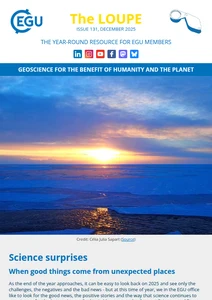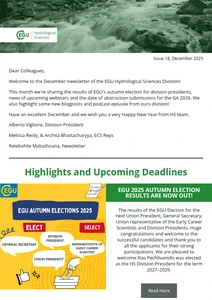President: Alberto Viglione
(Emailhs@egu.eu)
Deputy President: Maria-Helena Ramos
(Email)
ECS Representative: Melissa Reidy
(Emailecs-hs@egu.eu)
The Hydrological Sciences (HS) Division is concerned with all aspects of the terrestrial hydrological cycle (including precipitation, surface water, soil water, groundwater) from the pore scale to the global scale, and its relationships and interactions with the atmospheric part of the hydrological cycle. The division also covers the interaction between hydrology and geomorphology (e.g., erosion, sedimentation, groundwater systems), the relationships between hydrology and soils, as well as the interaction between the hydrosphere and the biosphere (e.g., ecohydrology, wetlands). The ways in which hydrological processes are observed, quantitatively computed, and forecasted are also addressed by the division. Management and operation of water resources by societies in various parts of the world is also within the division's realm.
The Hydrological Sciences Division (HS) has five main tasks:
- Organizing the hydrological part of the program during the annual EGU General Assembly
- Running its on-line open access journal: Hydrology and Earth System Sciences (HESS)
- Recognizing deserving colleagues in various stages of their careers with its Award program.
- Encouraging the interaction and active participation of young hydrologists within the hydrological community
- Circulating news, information, job adverts, announcements of opportunity or meetings that may be relevant to the hydrological community
Such tasks require considerable (voluntary!) input from many people, and offer plenty of opportunities to become actively involved.
To ensure that the sessions during the General Assembly cover our science as comprehensively as possible, there are currently ten Subdivisions, including a subdivision on general hydrology (monitoring and cross cutting issues). Distinct fields within the broad area of hydrology are covered. Each Subdivision Committee organises a set of oral, poster or PICO sessions to cover its field. The members of the Subdivision Committees meet during the EGU General Assembly and start preparing the draft programme for next year’s meeting in late spring/early summer. Membership of the committees of these Subdivisions is open: you can e-mail the Subdivision Committee Chair to request membership or you may directly join the meeting during the General Assembly to get involved in the Subdivision activities and in particular in the organisation of the programme, including proposal of sessions and volunteering as convener or co-convener (see overview of Programme Organisation and Convener Tasks).
You can also become involved in the Hydrology and Earth System Sciences (HESS) journal. In addition to submitting your best scientific work to HESS, consider that the journal needs both referees and members of its Editorial Board to cover a sufficiently broad spectrum of expertise to adequately handle all incoming papers. If you would like to become active as a referee or as an editor you may therefore consider informing any editor or Executive Editor of your wish.
The Division contributes to the EGU Awards & Medals programme that recognises every year eminent scientists for their outstanding research contribution and identifies the awardees as role models for the next generation of young scientists to foster geosciences research. In particular, members of the Division are invited to contribute to the nominations (deadline are every year on the 15th June, see here) for both the young and senior HS Division Awards and Medals (link).
The EGU offers a platform for young scientists to become involved in hydrological research, through sessions, social events and short courses at the annual General Assembly in April. Several activities are especially aimed for Young Scientists in the Hydrological Science, organised with the help of the Young Hydrologic Society.
Lastly, you are invited to share the news/information that may be of interest to the EGU Hydrological Sciences community, by sending a tweet to @EGU_HS or filling in the activity calendar webform.
Do not hesitate to contact the Division President or any Division Officer if you need any additional information on our activities!
Latest posts from the HS blog
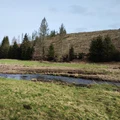
Prevent before repair: What a new hydrology-based index reveals about river ecological status
When I first began analysing agricultural pressures in German river networks, I expected the familiar story of nutrient loads, pesticide traces and differences between landscapes. What I did not expect was how narrow the ecological safe operating space has become for many rivers. Even small increases in agricultural pressure, especially from pesticides, reduced the likelihood of achieving good ecological status in a clear and consistent way. Seeing this pattern emerge across so many catchments made me look more closely at …
Read more
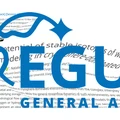
Last minute information for EGU26 abstract submission
If you have not yet submitted your abstract for this year’s General Assembly (GA2026), do not forget to submit as early as possible this week (instructions here), this avoids any last minute technical challenges. . You can submit only one abstract (except for invited speakers or if you submit to an EOS-session). For your hydrology-related research, the call-for-abstracts programme proposes the overwhelming choice of 165 sessions proposed by the ten subdivisions of the Hydrological Sciences division (HS) of EGU, 11 …
Read more
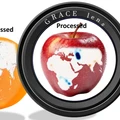
Comparing Apples to Apples: Filtering Water Storage Compartments for GRACE
Have you ever heard that we can “weigh” water on Earth from space? Since 2002, the GRACE and GRACE-FO satellite missions have been mapping month-to-month variations of the Earth’s gravity field. Because gravity responds to mass, these data can reveal how water is redistributed at the surface and in the subsurface. The result is a global time series of terrestrial water storage anomalies (TWSA)—how total water storage deviates from its long-term average. Many hydrologists and water-resources researchers use GRACE/GRACE-FO to …
Read more
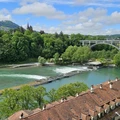
How to Create Your Own Water-Themed Audiotour
Imagine walking through the Swiss capital, Bern, a city full of water. While you walk, a voice from your headphones guides you along the way and tells you interesting facts about the river and other water sites. You discover the Matteschwelle dam, pass by several fountains, visit a historic weather station, and have a closer look at the clear blue water of the Aare River and its old bridges. This is possible with audio-guided tours – you can discover cities …
Read more
Recent awardees

The 2025 Henry Darcy Medal is awarded to
Jan Seibert for pioneering work promoting Open Science with hydrological models, and building bridges between experimentalists and modellers, between physical and conceptual approaches, and to citizen science.
Read more

The 2025 John Dalton Medal is awarded to
Paolo D'Odorico for outstanding scholarship on water and its ties to environmental justice, energy, and food security.
Read more

- 2025
- Outstanding Student and PhD candidate Presentation (OSPP) Award
The 2025 Outstanding Student and PhD candidate Presentation (OSPP) Award is awarded to
Ahmed El-Azhari Groundwater Salinity Drivers in Arid Endorheic Basins: Insights from Hydrogeochemical and Isotopic Analyses in Bahira, Morocco
Read more

- 2025
- Outstanding Student and PhD candidate Presentation (OSPP) Award
The 2025 Outstanding Student and PhD candidate Presentation (OSPP) Award is awarded to
Anna Leuteritz Celerity, velocity and length of near-surface flow pathways: insights from tracer experiments
Read more

- 2025
- Outstanding Student and PhD candidate Presentation (OSPP) Award
The 2025 Outstanding Student and PhD candidate Presentation (OSPP) Award is awarded to
Anton Köhler An Analytic Element Method solution for multispecies reactive contaminant transport
Read more

- 2025
- Outstanding Student and PhD candidate Presentation (OSPP) Award
The 2025 Outstanding Student and PhD candidate Presentation (OSPP) Award is awarded to
Fredrik Schück Modelling floods, droughts and humans: A systematic review of hydrological hazard management in agent-based models
Read more

- 2025
- Outstanding Student and PhD candidate Presentation (OSPP) Award
The 2025 Outstanding Student and PhD candidate Presentation (OSPP) Award is awarded to
Kansei Fujimoto Development of a new satellite rainfall product HiDRED (Himawari Data Rainfall Estimation using Deep learning) and a fundamental study on its applicability to hydrological models
Read more

- 2025
- Outstanding Student and PhD candidate Presentation (OSPP) Award
The 2025 Outstanding Student and PhD candidate Presentation (OSPP) Award is awarded to
Malin Grosse-Heilmann Assessing the Effects of Climate Change on Durum Wheat Yields in Mediterranean Regions: A Water-Food Nexus Perspective
Read more

- 2025
- Outstanding Student and PhD candidate Presentation (OSPP) Award
The 2025 Outstanding Student and PhD candidate Presentation (OSPP) Award is awarded to
Malve Heinz From Field to Catchment: Evaluating the Hydrological Effects of Soil Organic Carbon Increases
Read more

- 2025
- Outstanding Student and PhD candidate Presentation (OSPP) Award
The 2025 Outstanding Student and PhD candidate Presentation (OSPP) Award is awarded to
Palok Biswas Normatively Robust Mitigation Policy to Equitably Distribute the Remaining Carbon Budget
Read more

- 2025
- Outstanding Student and PhD candidate Presentation (OSPP) Award
The 2025 Outstanding Student and PhD candidate Presentation (OSPP) Award is awarded to
Peter Wagener Evaluating Hydrologic Processes and Their Drivers for a Large Geographical Domain
Read more

- 2025
- Outstanding Student and PhD candidate Presentation (OSPP) Award
The 2025 Outstanding Student and PhD candidate Presentation (OSPP) Award is awarded to
Sahar Jannesarahmadi The Role of Wind Velocity in Saline Water Evaporation from Porous Media and Surface Salt Crystallization Dynamics
Read more

- 2025
- Arne Richter Award for Outstanding Early Career Scientists
The 2025 Arne Richter Award for Outstanding Early Career Scientists is awarded to
Frederik Kratzert for outstanding research in hydrological modelling and open science, particularly through Artificial Intelligence-based approaches in large-sample hydrology studies.
Read more
Current issue of the EGU newsletter
In our December Issue we we are focusing on positive stories of surprises in science. Asmae Ourkiya shared how a prize established in 1900 to reward anyone making contact with alien life (expect Martians) ended up funding more than a century of astronomy research and innovation. Guest blogger Fernanda Matos described the discovery her autism had been driving her interest in Oceanography for years, in her blog on how we can better support people with disability in geoscience. And we highlight some surprises to avoid in our blog on the Austrian visa and Schengen system ahead of EGU26. Also catch up on all the upcoming dates for webinars and funding, including €10,000 to host a Geoscience Day event in your European country, and share your opinions on where EGU should be focusing strategically in the next 5 years in the EGU Members' Survey.
All this and much more, in this month's Loupe!
Read more
Current issue of the HS division newsletter
What is new in the Hydrological Sciences Division in December? This month we're sharing the results of EGU's autumn election for division presidents, news of upcoming webinars and the date of abstraction submissions for the GA 2026. We also highlight some new blogposts and podcast episode from ours division!
Have an excellent December and we wish you a very Happy New Year from our HS team.
Read more


















